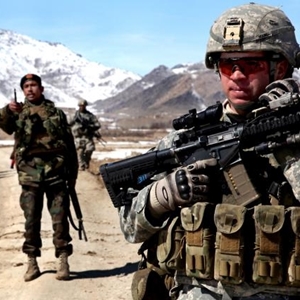A major component of the Army-wide drawdown of U.S. troops from Afghanistan and Iraq is the ongoing training of the Afghan army. The goal is to produce a self-sustaining defensive force native to the country that can defend itself from the domestic threat of militants. While a recent groundswell of Afghan support for the U.S. force may prompt a further look at the withdrawal, the U.S.'s top Navy SEAL assured troops that Afghan security forces continue to improve.
Working toward military autonomy
U.S. soldiers have been engaged in Afghanistan for more than a decade. With President Barack Obama's proposal to withdraw all but a small contingent of the Kabul embassy's security force from the country by 2017, a growing objective for soldiers in the area is not combat, but training the Afghan army to be a self-sufficient and resilient force. Military.com reported that Adm. William McRaven, the commander of U.S. Special Operations Command and the Navy's top-ranking SEAL, told the press at the 25th annual Special Operations and Low-Intensity Conflict conference Feb. 11 that he has confidence that the training is progressing.
"I'm pleased to say that each time I return, I see more and more progress," McRaven said. "Afghan security forces are good and thanks to our [special operations forces] investment, they are getting better."
McRaven's comments come at a crucial time when the U.S. and Afghanistan are attempting to broker a security pact for a longer American military presence in the country. Several critics have called attention to a perceived lack of readiness among Afghan troops, and a recent report from the Special Inspector General for Afghanistan Reconstruction found that the measurements military officials are using to gauge Afghanistan's readiness for military self-governance may not be as trustworthy as first thought.
All of this has called into question the appropriateness of a U.S. withdrawal.
"No longer are the Afghanistan people relying on coalition forces to play the leading role in providing security," McRaven told the conference. "No matter the size of our presence there next year, our future military-to-military engagements with the Afghans will remain vital in the region."
Working on a security pact
While McRaven believes that Afghan forces will be ready to defend their country after 2014, many others do not share his confidence. The Washington Post spoke to several Afghan officers about the stalled negotiations between the two countries on a security pact that would keep U.S. troops stationed on bases past 2012, and their responses were less than hopeful.
"If the international community leaves, there is no question that we will lose ground to the Taliban," Col. Mohammad Dost told the Post. "It's the biggest worry for every soldier now."
There has been a groundswell of support for the pact which President Hamid Karzai has refused to sign. Military officials in the country have taken to the newspapers, radio and television to voice their concerns. These moves of public dissidence have led to at least one Afghan general being informally removed from his post.
But as the Post spoke to soldiers, the threat of facing militants without U.S. support far outweighed backlash from the government.
"If the Americans leave, Afghanistan will be a lone sheep, left in the desert for the wolves to eat," Capt. Abdul Zahir told the paper.
Beyond troop strength, the Afghan army also relies on funding from U.S. sources. Numbering about 350,000 men, Afghanistan requires about $4 billion annually to operate its defensive forces but only grosses $1.7 billion in revenue. Among other countries, the U.S. is the primary contributor. While funding-only aid is possible, critics say ensuring that money goes to the right places within the Afghan government without boots on the ground would be difficult.

